
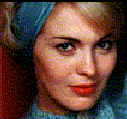


Jean Seberg first rose to prominence at the age of seventeen after she was selected from over three thousand hopefuls to play Joan of Arc in Otto Preminger's controversial biopic "Saint Joan". Playing opposite such heavyweights as Anton Walbrook, John Gielgud, and an outstanding Richard Widmark as King Louis, the young star turned in a mesmerising performance that encapsulated Preminger's vision of Joan with eerie precision. During the final scene, in which Joan is burned on a stake, Seberg actually took a fireball full in the face on camera, resulting in one of the most realistic and disturbing death scenes in cinema history. Yet while Preminger's uncompromising direction and superb performances from the leading players made for great art, the film was heavily criticised for it's secular approach to the tale of Joan of Arc, and it's depiction of organised religion as a force for brutal political regimes enraged the establishment, particularly in the USA. Despite the backlash, Preminger immediately cast Seberg again as a French cultural icon. This time she played Cecille the hedonistic but sensitive heroine of Francoise Sagan's ground breaking novel "Bonjour Tristesse". Having beaten Audrey Hepburn to the role, the vitality of her performance, later echoed by Sue Lyon in Stanley Kubrick's film of Vladimir Nabokov's "Lolita", saw her star in the ascent, particularly in France, where she became the figurehead of the "New Wave" cinema movement after her most extraordinary performance in Jean Luc Godard's cult classic "A Bout de Souffle".
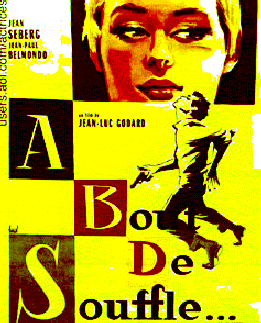
By 1960 Jean Seberg was a cultural icon herself in France, influencing the Parisien fashions every bit as much as Godard and Truffaut were influencing film. Her Hollywood performances, although never considered by Seberg herself to be of any consequence, were frequently stunning, and she was often compared to silent movie queen Louise Brooks for the intelligence that she brought to her roles. Her close friends included German born Fellini actress and model turned rock star Nico (they would later work together for Phillippe Garrell) and Russian intellectual Romain Gary (creator of Ghengis Cohn), who became her second husband.
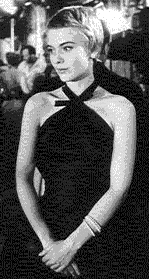
...I never knew until I came here that somebody could be really nice to you for years and really hate your guts. Happens all the time here...
In the late 1960s, Jean Seberg took more roles in Hollywood, most notably opposite Warren Beatty in "Lillith". She also became increasing active in left wing political groups. Her support for the anti-racist movement the Black Panthers, along with that of Jane Fonda, was well known. But such was Seberg's influence, esspecially in Europe, that FBI director J. Edgar Hoover considered her a genuine liability, and, in 1970 when she was seven months preganant, issued instructions that Seberg be "neutralised". Thus it was that a fake letter was "leaked" to the Hollywood gossip columns, suggesting that the father of the child was not Gary, but a member of the Black Panthers. The reaction so traumatised Seberg that she gave birth prematurely, and the child was stillborn. The next day Seberg called a press conference, where she presented shocked journalists with the body of her dead white child. The measure, though extreme, put an end to the rumours, but the FBI continued to hound Seberg until she eventually moved back to Paris.
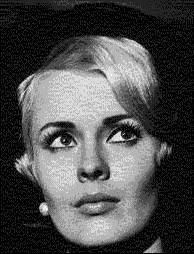
Although she continued to work successfully in France, even directing a film ("The Ballad of the Kid" in 1974), Jean Seberg succumbed to severe bouts of depression, and was hospitalised several times. On every subsequent anniversary of her child's death she attempted suicide. In 1978 she even survived an attempt during which she threw herself under a train on the Paris Metro. Following this attempt she seemed more at ease, and even planned a return to filmmaking in 1979. However, she was reported missing in Paris later that year, and despite public pleas for her to return home, her legions of fans feared the worst. She had been missing for two weeks when she was found dead in the back seat of her car in a Paris suburb on 7th September 1979. She had taken a massive overdose of barbiturates, and had been dead for eleven days.
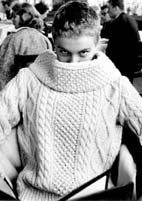
...the less I know about acting and the more I know about everything else, the better I'll be at both acting and living...
Jean Seberg was buried at Montparnasse Cemetery in Paris. Her funeral was attended by Jean Paul Sartre and Simone de Bouvoire, who now share a grave just metres away. Romain Gary himself committed suicide in 1980. Seberg and Gary were survived by a son, Diego Gary.
Twenty years after her death, Jean Seberg remains an icon in France and a cult figure the world over. Though her grave has become a place of pilgrimage for many, and her turbulant life a subject of intense scrutiny, it is her enduring screen image that continues to ensure her place in the hearts and minds of those who fall under her spell.
seberg speaks
An
interview in a Paris restaurant with Jean Seberg
and husband Romain Gary
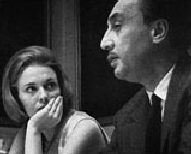
The Russian-born novelist Romain Gary met Jean a few years ago in
Los Angeles, when he was the French consul there and she was in
town shopping around for movie work. At the time, she was
married, and her French husband, very much a man for form,
thought it right that they call on his country's consulate. Jean
explained: "We left our calling card and all that sort of
thing. We had dinner with Romain a few nights later, and he made
quite an impression on me."
Gary's first meeting with her suggested a character for his novel
The Talent Scout. "I used the character to represent the
idealistic and unrealistic attitude of Americans, the American
na´vetÚ. But Jean loses her na´vetÚ rapidly under my
influence in real life," Gary said archly while looking
quite like a man pleased with his work. Jean confirmed all:
"I never knew until I came here that somebody can be really
nice to you for years and really hate your guts. Happens all the
time here."
Through dinner, the bits and pieces of evidence that Gary is cast
in the Pygmalion role opposite Miss Seberg's Galatea were as
plentiful as the fine wine. "You should see what I gave her
to read," Gary began. "Pushkin, Dostoevski, Balzac,
Stendhal, Flaubert..." "Madame Bovary!" Jean sang
out. "That could have been me if I had stayed in
Marshalltown one day longer."
"She is an absolutely marvelous reader," Gary claimed.
"She always finishes the book." "Except a couple
of yours, sweetie," she jabbed, and the jab might as well
have been a kiss. "What Romain really thinks is that I'm
still a dumb farm girl." "I'm being absolutely serious
about this," Gary went on. "She has brains and, what's
more, intellectual curiosity. I'll tell you how smart she is.
This girl detected French phonies faster than any American I have
ever seen here."
At that, Jean took over instantly: "I went through a very
rough period at first in Paris, when the French thought the
highest compliment they could pay me was that I didn't act like
an American at all. And you know what Frenchmen think about
American girls, don't you? They think that you have to break an
American girl in like you break in a horse. You have to comb it,
run it, train it, beat it. Same as a horse. That's what Frenchmen
think about American women.
"But American movie stars! You should hear Frenchmen on
that. When absolutely great French actors, I mean the very best
ones, hear that I was in Hollywood and had lunch with John Wayne,
they can hardly stand it. 'Just think,' they say, 'John Wayne.
You had lunch in Hollywood with John Wayne!'"
Talk about lunch in Hollywood led to talk about the food that
night in Paris, and Jean Seberg said that what she missed most in
Paris was pizza, but that she knew where to get hot doughnuts,
which are about as hard to find there as hot croissants in
Marshalltown. Her gratitude is deepest for the recurring
kindnesses of a girl in Baltimore who sends her big jars of
peanut butter.
"Now I want to say pretentious things. Is that okay? In my
long and difficult and mature life, I have come to learn that the
less I know about acting and the more I know about everything
else, the better I'll be at both acting and living. You want to
know what else I know? I know that the greatest of actresses has
about 20 good years of acting in her and that she will go on
living for 30 or 40 years as a human being. So, the conclusion I
have come to is that I can't make acting my whole life.
"Want to know what else? I'm lost to Debbie Reynolds' roles
and I'm not going to give Liz Taylor a run for her money. Now you
know absolutely everything about me, including the fact that I
was conceived, born and married in Marshalltown and that I will
probably be buried there in the fourth most beautiful cemetery in
the world..."